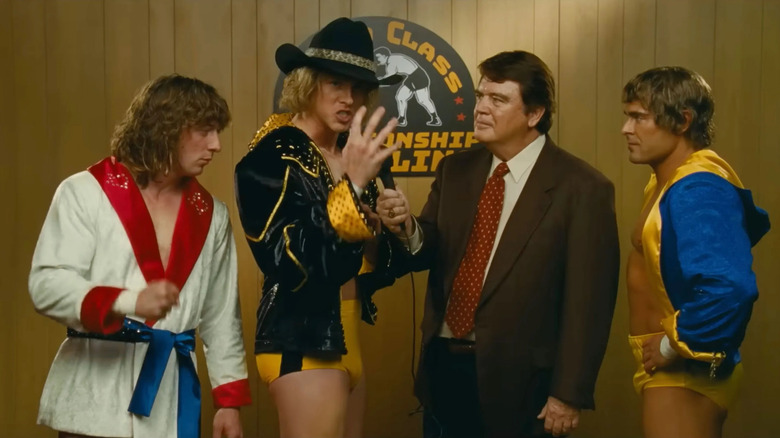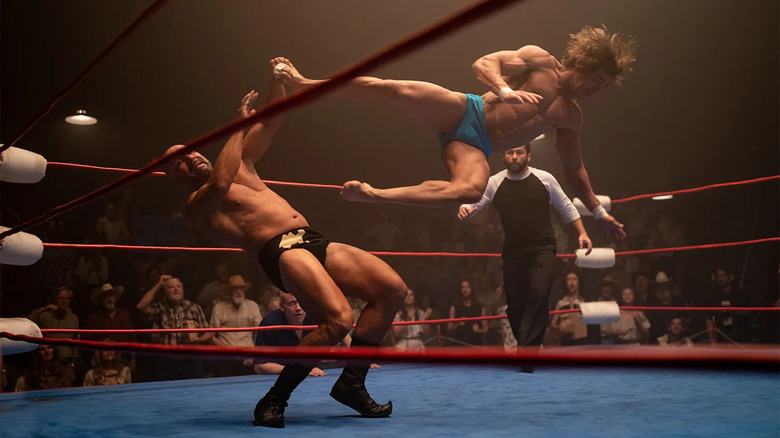The Most Devastating Scene In The Iron Claw Mirrors One Of The Sopranos' Secret Strengths
This post contains major spoilers for "The Iron Claw."
One of the most fascinating elements of HBO's classic TV series "The Sopranos" is that the supernatural exists.
It's not at the forefront. Not really. It lingers in the margins, ready to influence, entice, and disturb, but it never takes center stage. The ghosts of dead characters appear for brief moments. Children communicate with a dead parent. Impossible revelations come about from visions seen in dreams. And, of course, there's the episode where Tony Soprano is shot, clings to life, and finds himself wandering through purgatory. These scenes are frequently dismissed as dreams, figments of the imagination, flights of fancy, and a side effect of being raised Catholic. No one stops to linger on them. No one wants to admit they experienced them. That couldn't have actually happened, right? But it did. We, the audience, saw it. We know it's real, even if the characters refuse to admit it.
I've always found this to be one of the great quiet strengths of "The Sopranos." Whether the audience believes in the spiritual or not, these characters, and their otherwise realistic world, are being judged and observed by God and the devil, and their sins can literally follow them. The thin veneer of the unreal, a vague magical realism, over a story otherwise set in our reality can be nothing short of haunting.
So I was pleasantly surprised to see the wrestling drama "The Iron Claw" follow a similar path.
A family curse
Sean Durkin directs "The Iron Claw" with a grounded realism appropriate for a story so tragic. The real-life tale of the Von Erich wrestling clan is so devastating, so brutal to endure, that any other approach could render it cartoonish or even offensive. Durkin films this family like a welcome guest invited into their most intimate moments, allowing us to witness their greatest triumphs and defeats, family dinners and casual dates, workout sessions and party-going. The cast, including but especially Zac Efron and Jeremy Allen White, are so stripped-down, so understated, that these men feel less like movie characters and more like guys we happen to know. Which makes it all the more painful when they start to tragically die.
Efron's Kevin blames the family curse, a notion that his wife and the mother of his children finds to be absolute hogwash. But he's convinced. After all, why else are his brothers dying, one by one? He won't even let his kids use the Von Erich name. He's superstitious, and the bleak reality of the deaths surrounding him feed it.
But Durkin is nothing if not an empathetic filmmaker. Kevin's obsession with the family curse isn't treated as deranged — it's how he grapples with the sheer amount of pain in his life, the only defense mechanism he has against inexplicable tragedy. And the film suggests there could be truth to this whole curse thing. Note how "The Iron Claw" temporarily resurrects a dead character and inserts them into the background of a key scene to witness a family triumph — to be present for his brother's victory.
The characters in the movie don't see it. But we, the audience, do. The characters can't dismiss it as a hallucination because they weren't aware of it. But we're aware of it. The audience sees all. We cannot be deceived. That was a ghost.
A family reunion
The most devastating moment in "The Iron Claw," the one that sent my theater into full blown sobs and heaving shoulders (myself included), comes late in the film. Kerry Von Erich has died by suicide. But then we see him piloting a boat down a river, approaching a dock. He leaves behind a coin — a key plot point and also an astute visual that recalls payment for passage down the River Styx in Greek mythology — and joins his three dead brothers on land. They look as they did when they passed, including the firstborn son, who died when he was a young boy. They embrace. They're happy to see each other; they're glad to have left behind their pain and can spend eternity with one another.
Durkin's filmmaking does not change during this sequence. It is not shot to resemble a dream sequence or a fantasy. That naturalistic lighting, the subdued performances, and his gentle camera all act as they do in the rest of the film, during scenes set in the "real" world. The talk of curses, the glimpses of ghosts ... they were real. And in a moment built to burn down any moviegoer's emotional defenses, he takes us on a journey into the afterlife, to let us spend one more moment with the characters who have moved on.
In "The Iron Claw," the afterlife exists. And like with "The Sopranos," it's just a fact of life, an extension of the beliefs and drives witnessed in the rest of the story. No show and no movie have contained more powerful spiritual imagery. And they make for unlikely pop culture cousins.
I discussed this movie, along with my other favorite movies of 2023, on today's episode of the /Film Daily podcast, which you can listen to right here:
You can subscribe to /Film Daily on Apple Podcasts, Overcast, Spotify, or wherever you get your podcasts, and send your feedback, questions, comments, concerns, and mailbag topics to us at bpearson@slashfilm.com. Please leave your name and general geographic location in case we mention your e-mail on the show.


